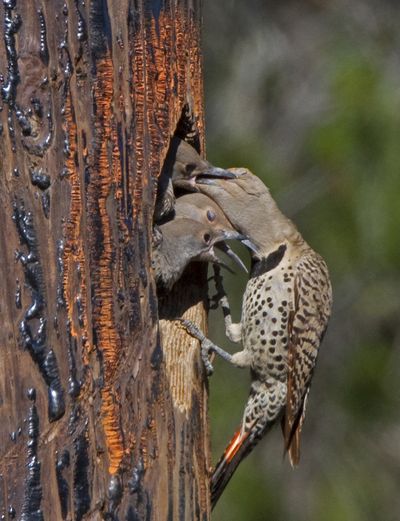Pole spared for birds

Heavy equipment operators could sometimes be accused of being on a power trip when they’re maintaining the huge transmission lines that traverse wildlife habitat in this region.
But neighbors say a Bonneville Power Administration crew working near Colbert last month deserves a tip of the hat for their sensitivity to a just-hatched family of woodpeckers that could have been regarded as pests.
Pileated woodpeckers had bored two large, deep, nesting cavities on opposite sides of a power pole even though the wood had been treated with smelly, black creosote preservative.
Jeanne Dammarell, who lives nearby, had observed the birds excavating the holes several years ago before raising the first family there.
The next year, she said, a pair of American kestrels fledged a brood from one hole.
Two years ago, BPA inspectors circled the holes with orange paint, indicating that the hazard had been found. The weakened Bell-Addy Corridor poles had to be replaced and a fix was being ordered.
When Dammarell saw pileated woodpeckers back checking out the hole this spring, she called the BPA and asked them to delay the work until nesting season was over.
“They said it wouldn’t be easy to change their schedule,” she said.
Tina Wynecoop, another area resident and active birder, drove over to check things out when the crews showed up in June.
“I watched the men work and noticed, after the pole had been cut and was suspended in the air, that a large bird was peering out of the nesting cavity,” she said.
“I asked the crew if they could let the pole down gently so I could capture the birds.”
As they obliged, three northern flicker chicks popped out of the hole and Wynecoop was able to gather them.
The crew went a step further to work with the situation. They sawed off the cavity section from the old pole and fastened it on the ground against a standing power line pole, leaving the nest hole unobstructed.
“It was touching to observe such expert maneuvering and gentleness,” she said, recalling her experience as a temporary foster parent.
She replaced the birds in the nest hole and the crew worked the rest of the afternoon replacing the damaged pole.
After the crew left, the flicker parents returned to continue feeding the three young northern flickers.
“Wildlife trees are an important part of the ecosystem and I guess a power pole looked just like one to them,” she said in a letter of thanks she wrote to the BPA.
“You earned a feather in your hardhats!”